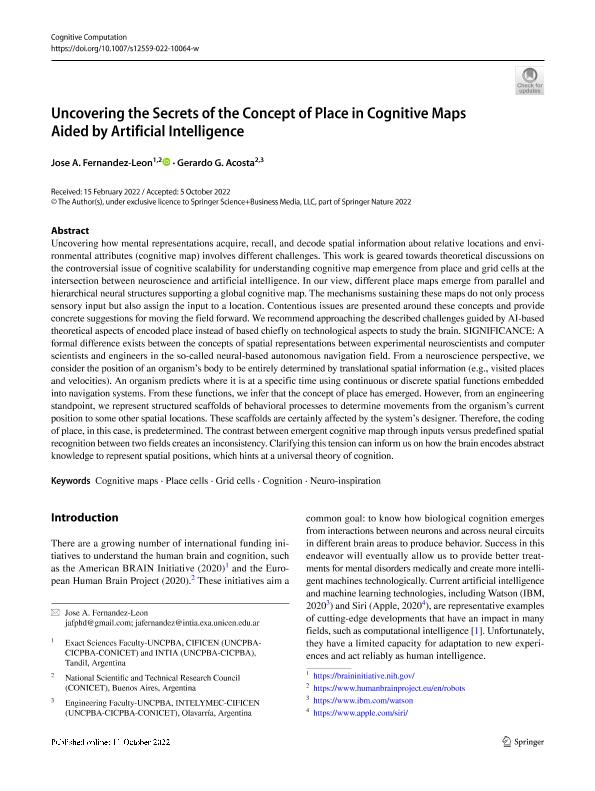Artículo
Uncovering the Secrets of the Concept of Place in Cognitive Maps Aided by Artificial Intelligence
Fecha de publicación:
10/2022
Editorial:
Springer
Revista:
Cognitive Computation
ISSN:
1866-9956
e-ISSN:
1866-9964
Idioma:
Inglés
Tipo de recurso:
Artículo publicado
Clasificación temática:
Resumen
Uncovering how mental representations acquire, recall, and decode spatial information about relative locations and environmental attributes (cognitive map) involves different challenges. This work is geared towards theoretical discussions on the controversial issue of cognitive scalability for understanding cognitive map emergence from place and grid cells at the intersection between neuroscience and artificial intelligence. In our view, different place maps emerge from parallel and hierarchical neural structures supporting a global cognitive map. The mechanisms sustaining these maps do not only process sensory input but also assign the input to a location. Contentious issues are presented around these concepts and provide concrete suggestions for moving the field forward. We recommend approaching the described challenges guided by AI-based theoretical aspects of encoded place instead of based chiefly on technological aspects to study the brain. SIGNIFICANCE: A formal difference exists between the concepts of spatial representations between experimental neuroscientists and computer scientists and engineers in the so-called neural-based autonomous navigation field. From a neuroscience perspective, we consider the position of an organism’s body to be entirely determined by translational spatial information (e.g., visited places and velocities). An organism predicts where it is at a specific time using continuous or discrete spatial functions embedded into navigation systems. From these functions, we infer that the concept of place has emerged. However, from an engineering standpoint, we represent structured scaffolds of behavioral processes to determine movements from the organism’s current position to some other spatial locations. These scaffolds are certainly affected by the system’s designer. Therefore, the coding of place, in this case, is predetermined. The contrast between emergent cognitive map through inputs versus predefined spatial recognition between two fields creates an inconsistency. Clarifying this tension can inform us on how the brain encodes abstract knowledge to represent spatial positions, which hints at a universal theory of cognition.
Palabras clave:
COGNITION
,
COGNITIVE MAPS
,
GRID CELLS
,
NEURO-INSPIRATION
,
PLACE CELLS
Archivos asociados
Licencia
Identificadores
Colecciones
Articulos(CIFICEN)
Articulos de CENTRO DE INV. EN FISICA E INGENIERIA DEL CENTRO DE LA PCIA. DE BS. AS.
Articulos de CENTRO DE INV. EN FISICA E INGENIERIA DEL CENTRO DE LA PCIA. DE BS. AS.
Citación
Fernandez Leon, Jose Alberto; Acosta, Gerardo Gabriel; Uncovering the Secrets of the Concept of Place in Cognitive Maps Aided by Artificial Intelligence; Springer; Cognitive Computation; 10-2022; 1-11
Compartir
Altmétricas




